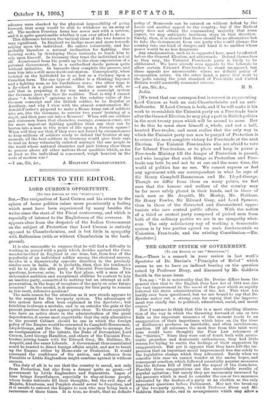[TO THE EDITOR OF THE "SPECTATOR:1
Sra,—The resignation of Lord Curzon and his return to the sphere of home politics raises more prominently a feeling which must have been experienced by many besides the writer since the start of the Fiscal controversy, and which is especially of interest to the Englishmen of the overseas. It appears clear from the despatch of the Indian Government on the subject of Protection that Lord Curzon is entirely opposed to Chamberlainism, and is but little in sympathy with Balfourism (with or without Chamberlain in the back-
ground).
It is also reasonable to suppose that be will find a difficulty in working in accord with a party which decides against the Coin- znander-in-Chief in England at one time, but, from fear of the popularity of an individual soldier among the electoral masses, decides in a diametrically opposite direction in the precisely similar case in India. It is probable, then, that his tendencies will be to join the able party of Unionist Free-traders. Two questions, however, arise. In the first place, will a man of his unbounded ambition and exceptional abilities be content to join an inactive party, committed to nothing but an attempt at self- preservation, in the hope of recapture of the party on some future occasion ? In the second, is it necessary for this party to remain in this inert, defensive position ?
The main reason for the situation as it now stands appears to be the respect for the two-party system. The advantages of this system have often been explained in the Spectator; but fetichism is always a mistake, and to an outsider the gain at the present juncture does not appear quite clear. To those especially who have an active share in the administration of the great dependencies, it seems most regrettable that the only alternative to the present Cabinet should be one in which the foreign policy of the Empire would be entrusted to Campbell-Bannerman, Lloyd-George, and the like. Surely it is possible to arrange for an amalgamation of the talents, the Duke of Devonshire, Lord Curzon, Lord George Hamilton, and others of the Unionist Free- traders joining hands with Sir Edward Grey, Mr. Haldane, Mr. Asquith, and the saner Liberals. A Government thus constituted could be trusted to direct foreign affairs aright, and not to break up the Empire either by Home-rule or Protection. It would command the confidence of the nation, and sufferers from Fiscalitis or Little Englandism might combine against it without success.
The duty of all is to see that the country is saved, not only from Protection, but also from a danger quite as great,—of government by Little Englanders and Separatists. Lapse of time brings forgetfulness, especially to stay-at-home people, whose home interests fill their thoughts ; but the evil days of Majuba, Khartoum, and Pen jdeh should never be forgotten, and it is unsafe to entrust the Empire to men who may bring back a recurrence of those times. It is true, no doubt, that no definite
policy of Home-rule can be entered on without defeat by the Lords and another appeal to the country ; but if the Radical party does not obtain the commanding majority that some expect, we may anticipate insiduous steps in that direction. Surely, then, it is absurd that there should be no alternative but to take the Government from one party who would plunge the country into one kind of danger, and hand it to another whose power would be no less dangerous. Any amalgamation, such as is suggested here, must be effected before the General Election, not afterwards. Defend themselves as they may, the Unionist Free-trade party is likely to be obliterated. We have already seen appeals to the Liberals to allow certain Unionist Free-traders to stand unopposed, but these appeals are unreasonable where no definite policy of co-operation exists. On the other hand, a party that went to the polls raising the joint standard of Free-trade and United Britain would assuredly command success.
—I am, Sir, &c., M. B.
India.
[We trust that our correspondent is correct in represmting Lord Curzon as both an anti-Chamberlainite and an anti- Balfourite. If Lord Curzon is both, and if be will make it his work to re-establish the Unionist party on a Free-trade basis after the General Election, he may play a part in British politics
in the next twenty years which will be second to none. But to do this he must show himself a, whole, and not a half, hearted Free-trader, and must realise that the only way in which the Unionist party can now be purged of Protection is to secure the most complete victory for Free-trade at the next Election. For Unionist Free-traders who are afraid to vote for Liberal Free-traders, or to place and keep in power a Free-trade Ministry till the danger of Protection is passed, and who imagine that such things as Protection and Free- trade can both be and not be at one and the same time, the world of politics has no use. We cannot express or feel any agreement with our correspondent in what he says of Sir Henry Campbell-Bannerman and Mr. Lloyd-George. Though we differ from them on many points, we feel sure that the honour and welfare of the country may be far more safely placed in their bands, and in those of such men as Mr. Asquith, Mr. Morley, Mr. Haldane, Sir Henry Fowler, Sir Edward Grey, and Lord Spencer, than in those of the distracted and disconsidered oppor- tunists who now control public affairs. With the notion of a third or central party composed of picked men from both of the ordinary parties we are in no sympathy what- ever. The only satisfactory way of working a democratic system is by two parties agreed on such fundamentals as Unionism, Free-trade, and the existing Constitution.—ED. Spectator.]
THE GROUP SYSTEM OF GOVERNMENT.














































 Previous page
Previous page